In the new rock biopic, The Runaways, a glum Kristen Stewart sits poolside, suckling vodka from a water pistol before pushing it suggestively down the front of her stomach. In a separate scene, she coaches a bathing teenage band mate on how to get wet using a mental image of Farrah Fawcett and a shower head. And then there’s co-star Dakota Fanning, better known as Hollywood’s 15-year-old precocious precious, who hoovers enough blow on an airplane to soar with Kenny Powers. These scenes are presented as the on-tour lifestyle of the titular ‘70s all-girl rock band, assembled and curated by the group's wiry and rude L.A. producer, a man named Kim Fowley. Foreseeing the popularity of The Runaways for their jail-bait appropriation of the aggression, punk music, and horniness typically associated with adolescent males, Fowley had no qualms with solidifying a legacy by way of the girls' quicksilver paths to self-destruction. Actor Michael ...
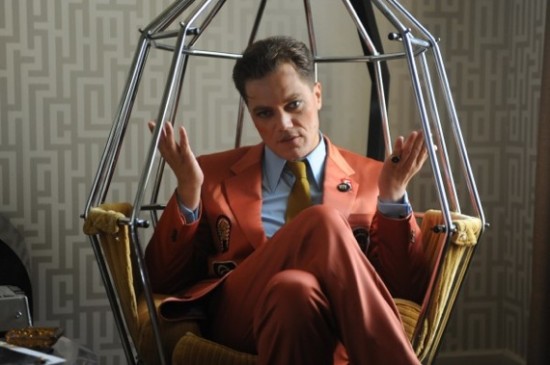
In the new rock biopic, The Runaways, a glum Kristen Stewart sits poolside, suckling vodka from a water pistol before pushing it suggestively down the front of her stomach. In a separate scene, she coaches a bathing teenage band mate on how to get wet using a mental image of Farrah Fawcett and a shower head. And then there’s co-star Dakota Fanning, better known as Hollywood’s 15-year-old precocious precious, who hoovers enough blow on an airplane to soar with Kenny Powers. These scenes are presented as the on-tour lifestyle of the titular ‘70s all-girl rock band, assembled and curated by the group’s wiry and rude L.A. producer, a man named Kim Fowley. Foreseeing the popularity of The Runaways for their jail-bait appropriation of the aggression, punk music, and horniness typically associated with adolescent males, Fowley had no qualms with solidifying a legacy by way of the girls’ quicksilver paths to self-destruction.
Actor Michael Shannon plays Fowley with a commitment and intensity welcome and familiar to any viewer who saw his performance in the new Southern indie classic Shotgun Stories or as the best part of Revolutionary Road (which earned him an Oscar nom for Best Supporting Actor). In recent days, Fowley has come out in support of Shannon’s performance, calling him the Christopher Walken of a generation. Given Shannon’s unflattering if amusing portrayal of the guy as an id swimming in midnight oil and the naivety of young girls, the endorsement is mildly surprising. But the comparison is astute. After interviewing the actor this week in a hotel in NYC, I couldn’t shake similar comparisons with the cornhusk steeliness and alertness of a 30something David Letterman and the seen-a-lot-of-shit-ness of Ray Liotta. In our below interview, Shannon discussed the contradictions of Fowley, HBO’s forthcoming Martin Scorsese series Boardwalk Empire, and the time he hid in a doghouse.
Hunter Stephenson: It’s cool to talk with you. Shotgun Stories was one of my favorites for 2008.
Michael Shannon: Man, thanks. I’m glad you liked it. I might make another film with [writer/director Jeff Nichols] this summer. You know his film, Goat, it’s been in a standstill for a while. There was was a lot of motion on it at one point and then it just slowed, so we’re both suddenly more interested in this project called Shelter. And Jeff’s also developing a show for HBO right now, I think…
And you’re in a show for HBO, Boardwalk Empire. I actually watched the trailer today, it just hit, and the production values look top shelf…
Michael Shannon: Yeah? So it looks good? That’s the thing about the pilot because we had Scorsese there [directing], so he’s going to make sure everything looks wicked. And it did. I mean, it looked wicked when I was sitting on the set watching it happen, so I can imagine the trailer. The production budget was really high, so I think HBO really believes in it. They’ve already spent a lot of money.
Several of the characters you have played recently have a chaotic center or border on crazy. Kim Fowley falls in line with that. Is there anything in your formative years—or in your current worldview— to explain the appeal of these characters for you as an actor?
Michael Shannon: Well, I certainly think the world is chaotic. I mean, to me the essence of drama is conflict, right? Drama is people dealing with extreme experiences and situations. I guess I’ve seen movies recently where characters are less “stressed out” than the ones I have played, but it’s not like I don’t enjoy those movies. But personally I wouldn’t know how to—in order for me to invest in a character, I need to know what’s troubling him. That’s the first thing I think about when I read a script: what’s bothering this person? Internally and across the board. What do they have to overcome? I mean, you brought up Shotgun Stories, my character, Son, appealed to me because he was very mild mannered but the situation he’s trying to overcome—he’s trying to take care of his brother and his family and be a good person. But there’s a huge conflict. The title to that movie is very interesting. I know that Jeff was worried that it was giving too much away.
And of course, it’s also a matter of the opportunities I’m presented with. It’s not like I’m sent every script in Hollywood. [laughs] Runaways came to me because I bear a bit of a resemblance to Kim Fowley, and they probably could have gotten an actor who was more famous or of a higher profile, but it wouldn’t have matched up.
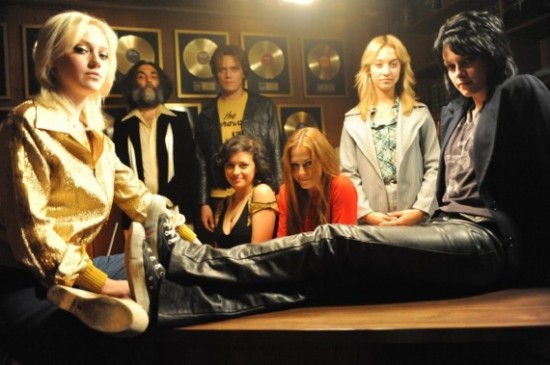
The film opens with a shot of period blood on the ground. How did you interpret that when you first saw the film?
Michael Shannon: It represents the huge transition that all women go through. I mean, I have a daughter now, so when I see that scene I hope that one day that’s going to be my daughter. I hope that one day my daughter is going to look down and see red, and she’s going to start becoming a woman. I just can’t imagine how frightening that must be. I mean, the only thing I can equate to that growing up as a boy was the first time you have to change your clothes in a gym room. It doesn’t compare. It’s like in life, no matter what the man has to go through, what the woman goes through seems more difficult. And the opening is not only a sign of Cherie Currie [Dakokta Fanning] growing up, but she had a really tough childhood as the film shows—it sort of represents what she would later have to endure to be a part of the band.
I read that you studied Kim Fowley by watching an interview he did from the ’70s with the great Tom Snyder. That was the first time I remember seeing him as well. [Ed. Note: The interview is included on this DVD set. I've posted the YouTube version below, good stuff.] You know, watching it, can you elaborate on what drew you in? Fowley makes such an impression…
Michael Shannon: I could definitely gain just from the interview that he was wicked smart. I mean, here’s a guy who—I would’ve been very nervous in his situation—he’s clearly on enemy territory. Tom Snyder, at the beginning of the interview, he seems to have made up his mind that punk rock is a mess and isn’t going to go very far with the public. He’s looking down his nose at it a little bit and taking shots. And I’m sure Kim was nervous underneath, but he was so able to take the blows and come back with his own venom—and his own sparring. He cracked me up. Everything he said made me laugh. And his body is so interesting in that interview, the way he moves and expresses himself physically…
He makes fey seems dangerous…
Michael Shannon: Yeah. It’s weird. The whole time you’re trying to figure out: is he effeminate or is he not effeminate? And of course, underneath it all, he’s not effeminate at all. He’s totally a man and he’s very much into spending lots of time with the ladies, and what not. Not that it matters one way or the other, but it’s that contradiction that makes him interesting. I mean, that was one of the great things about the Glam Era; everyone thought these guys looked so poofy, but underneath they were as red blooded as any other tough guy.
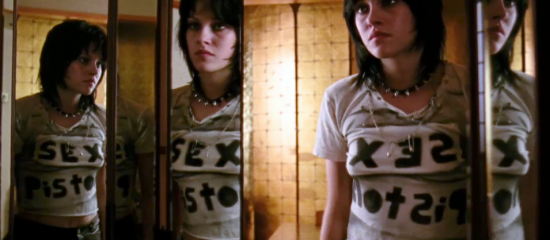
How does Fowley compare in your opinion to other wild rock and punk producers like Phil Spector and Malcolm McLaren?
Michael Shannon: You know, there are definitely some similarities. I am always shocked by how long Kim has been around—how many different artists he’s worked with and so many different kinds of sounds he helped develop and participated in. How much he’s done. Even the music he has personally performed and sings, so much variety there. You know, I associate Phil Spector with the Wall of Sound, I associate Malcolm McLaren with The Sex Pistols, very specific moments in music. When you say, “Kim Fowley,” I mean The Runaways are definitely a component of him but it’s not the only thing. Forty years of creativity. His whole involvement with The Runaways was very brief—like in the movie, he says “The Runaways were ‘a concept.’” He would be the first one to tell you how smart he is, he claims to have an IQ over 160, and that could very well be true from what I have seen and from [hanging out] with him. He gets bored very easily, so he has to keep creating and changing.
Watching the film, I wondered what its release will mean to modern youth culture. Newer rock music has become really stagnant, I don’t know if you’d agree, but it doesn’t attack the way it used to. And if you agree, why is that? Is it because rock originally stressed the individual, and now, in the Digital Age, it’s like throwing a voice down a river? There are less obvious targets for the same reason, maybe.
Michael Shannon: That’s a good question. There are a couple of moments in the film where, if you pinch yourself and think about what’s happening, it’s a little disturbing. It’s like you say, so many people now are always on computers, and I really miss the days where you would have to go out and buy an album and have the cover art. And you listened to it from beginning to end. Now it’s a constant shuffle. People listen to Stevie Wonder or Ray Charles one minute, and Clap Your Hands Say Yeah! or whatever the next minute. Totally arbitrary and, you know, it seems like music is becoming something to help people deal with their ride on the subway. A lot of the stuff I hear now, people use it just to pass time. I think music used to be a lot more than that. Rock music used to be a mission, and these girls were on a mission. There is interesting rock music now, don’t get me wrong, but a lot of it doesn’t have the passion or the urgency. So, this movie is not going to start a revolution or anything. You have to contextualize it. It’s a snap shot of a very particular time.
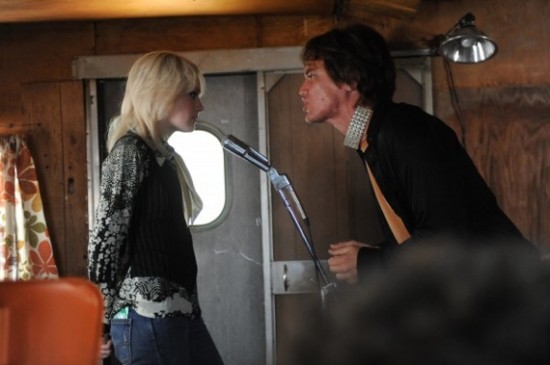
In the film, Kim puts The Runaways through rock boot camp by having kids throw cans and actual shit at them. In your younger days, did you ever whip a bottle at a band at a concert?
Michael Shannon:The story that comes to mind has absolutely nothing to do with music, and it’s from when I was very young. I was about seven or eight, and in the backyard—across the back fence of our yard there was another yard and a house and a little girl lived there. And I went over to the fence and she called me a name, she called me a dog, and she was throwing dog food at me. And I guess it really hurt my feelings. [laughs] So, I reached down and picked up, like, this half of a brick and threw it over the fence at her. [laughs] And it hit her. It hit her in the head. And she started bleeding. And I lost it. I really thought I was going to die. And we had a huge Irish wolf-hound at the time, he lived in this huge doghouse…
What was the dog’s name?
Michael Shannon: Mack, Mack-dog. And I was literally in the doghouse, and I hid there for so long. The dog was in the house. And finally, my mom came outside and said, “Michael? I know you’re in there.” Thank god that little girl was okay. It was a very strange thing.
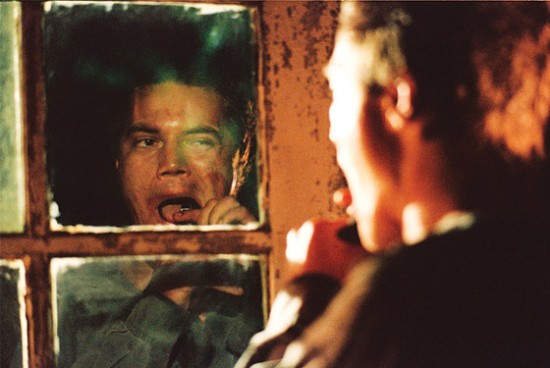
I can’t interview you and not ask about Bug. The film [adaptation] is really great and so claustrophobic, but I never saw you perform it originally for the stage. Would you consider revisiting the play? And did the play ever draw paranoiacs or did you ever receive strange fan mail?
Michael Shannon: No, by and large, all of the fans of Bug I have encountered for the play and the film have been pretty straight up, just normal people. I think people who were truly paranoid couldn’t watch it, or maybe would be afraid to see it. Or maybe it wouldn’t live up to their own hallucinations. I don’t know. I made a conscious choice once I did the movie—I had performed Bug over 200 times on stage; I did it in London, I did it in Chicago, and I did it here in New York. And there was actually a production going on in L.A. and they called me, and I said no, I said I was all Petered Evans’d out. It was a tough role, because when I was doing the play version, we would do it eight times a week, sometimes twice a day. I love that character to death, but man, it was intense.
Hunter Stephenson can be reached on Twitter.
Tom Snyder’s round table interview with Kim Fowley, Joan Jett, Paul Weller, and others (1977)

No comments:
Post a Comment